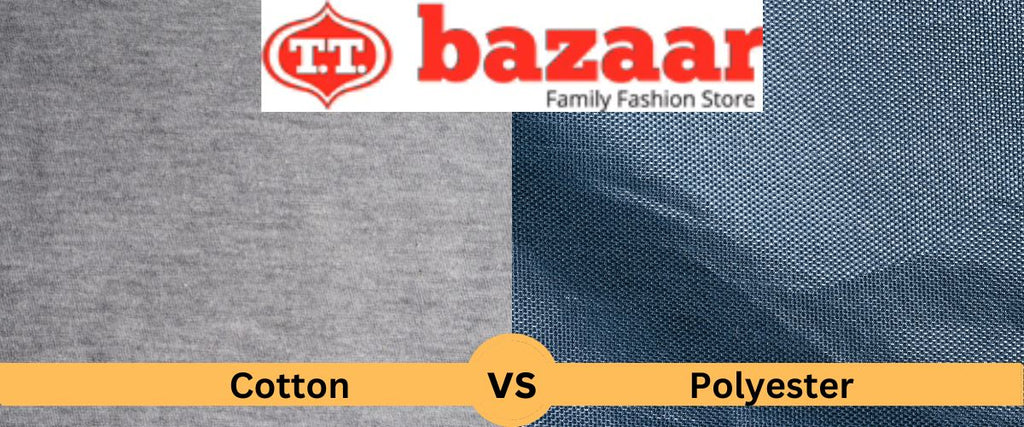Cotton vs Polyester: Which is better in Cold weather?

Cotton and polyester are two go-to fabrics for garments; however, they are entirely different from each other. While cotton is more breathable and keeps your body temperature lower, polyester is moisture-wicking and keeps you dry.
Since both fabrics are widely used for similar purposes, people often get confused while making a choice. But there’s no need to freak out as we are here to assist. Keep reading to find out more about cotton vs polyester and pick the most appropriate fabric for winter warmth.
A Quick Overview of Cotton and Polyester & Their Key Properties
Before we jump into the differences, let’s learn a bit more about these fabrics and their key characteristics first to get a better understanding.
Cotton
Cotton is mainly produced from the cotton plant and the fibers have a flat, twister, and ribbon-like appearance. It grows in subtropical countries and requires 6-4 months of warm weather. This fabric is the purest form of cellulose available in nature. While the basic color of cotton fiber is yellowish or creamy white, it can also be available in green, dark brown, and dirty grey shades.
Pros
- It is soft and highly breathable.
- This fabric ensures long-lasting comfort.
- Cotton fiber is hydrophilic and absorbs moisture readily without making you feel uncomfortable.
- It is highly versatile and thus widely used for a variety of products, including garments, tarpaulins, tents, window shades, and more.
- It can easily withstand high temperatures.
- Sweat patches
- Doesn’t dry quickly
- Shrinks
- Wears out over time
Polyester
Polyester is a petroleum-based man-made synthetic material, which is way lighter and more durable than cotton. It came into existence in the 20th century and was introduced as a garment fabric in the 1970s. Since polyester is artificial in nature, it is widely used as a cheaper alternative to cotton. It is a popular fabric for outdoor activities due to its moisture-wicking and quick-drying properties. Te weave and manufacturing process make polyester an all-weather fabric. It is great at holding body heat and thus can keep you warm and dry during winter.
Pros
- Low moisture regain value
- Resistant to staining
- Strong and Durable
- Excellent wear and abrasion resistance
- Can be easily textured and modified
- Easy to wash and doesn’t shrink
- Non-breathable, especially in hot conditions.
- It might generate static electricity owing to its hydrophobic nature.
- It is a heavy fiber
- Polyester might retain odors.
Cotton Vs Polyester - 4 Key Differences to Know
Now that you have learned about both cotton and polyester fabric, let’s move on to the major differences between them so you can make an informed choice for the winter season.
1. Warmth
Check the tag on your winter clothing; it must state that some percentage of the fabric is polyester. When it comes to warmth, polyester is a clear winner for several reasons. First, it is made of very fine threads of plastic, which further make it great at holding in your natural body heat. Secondly, polyester is the ultimate choice for layering, thus keeping you warm to an extent. So, if we compare cotton and polyester in the terms of warmth, the latter is a clear winner as it will act as a shell over your winter clothing, trapping the heat inside and making you warm.
2. Breathability
One of the critical differences between cotton and polyester is breathability. It refers to the fabric’s ability to allow moisture to escape from the body while air circulates through the fibers. Unarguably, cotton is entirely breathable, making it great for wearing close to the skin. Owing to this, you can use this fabric for layering purposes during winter. However, cotton isn’t great at wicking moisture away. The thickness of this fabric usually determines how long it takes to dry.
On the other side, polyester isn’t breathable but being a synthetic material, it doesn’t absorb liquid and dries fast.
3. Durability
When it comes to durability and strength, nothing can leave behind polyester as this fabric is made of plastic threads, which further adds strength to the same. They don’t break down, making the fabric exceptionally strong and able to withstand wear and tear. However, cotton, on the other hand, is soft and can be easily damaged. But the overall durability of the cotton depends on the weave density. The heavier cotton is, the stronger it tends to be.
4. Softness
Cotton is obtained from the fluffy fibers of the cotton plant, therefore, it is naturally soft fiber. However, you should remember that not all cotton fibers are soft to wear as the term “cotton” covers a vast range of fabrics, including lightweight cotton voile and heavyweight twill. However, polyester is an artificial fabric derived from artificial fibers, hence it feels more like plastic and doesn’t have the same softness you would get from cotton.
Which is Better - Cotton Or Polyester?
Cotton and Polyester are among the popular fabrics for garments and other identical purposes, and each comes with its advantages and disadvantages. Therefore, the choice between them boils down to your preference and taste. However, if you are looking for fabric for cold weather, then polyester might be the better bet, owing to its heat-retaining and moisture-wicking properties.
 sweatshirt
sweatshirt
 All
All




